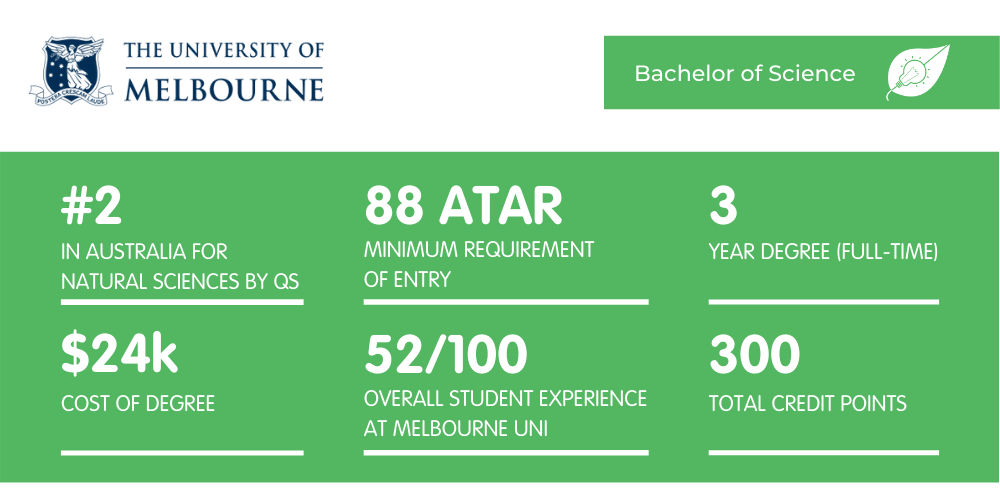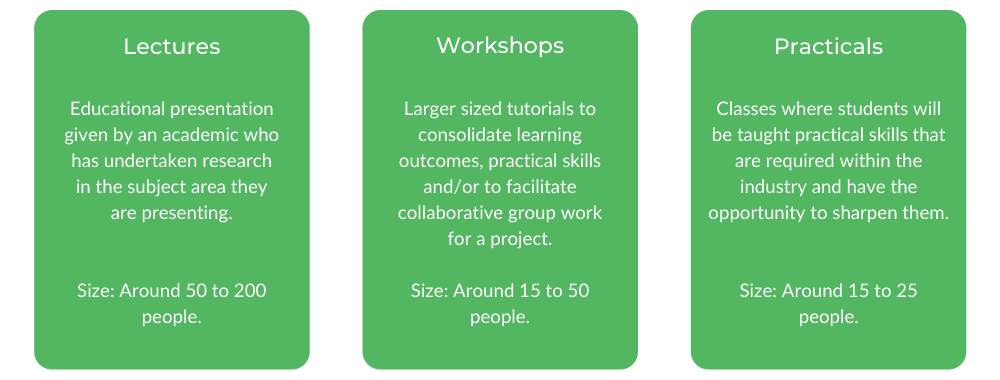
Have the sciences been your favourite subjects at school and you’re looking for further study related to science? Then, applying for a Bachelor of Science at UniMelb could be the right degree for you!
In this article, we’ll be going through the core units, majors, assessments and everything else you’ll want to know before applying to this degree.
Let’s dive in!
What is a Bachelor of Science at UniMelb?
Subject Sets and Majors
How to Get into a Bachelor of Science at UniMelb
What’s the Teaching Format?
What’s the Faculty and Culture Like?
What is a Bachelor of Science at UniMelb?
A Bachelor of Science is a three-year degree that allows its students to learn a broad range of subjects and further specialise their knowledge into one major.
The course is designed to be a flexible degree, which acknowledges that students will require time and exposure to figure out their interests. To reflect this, science students at Melbourne University complete most of their major during third year.
Graduates come out with a set of problem-solving, technical and communicative skills that correspond to modern scientific methods. These can be applied to pursue postgraduate work, or to qualify for the student’s desired employment.
Honours
While a Bachelor of Science cannot be studied as a double degree, Bachelor of Science students can apply for an additional one-year Honours program, so long as they meet a WAM of 65%.
Learn more about Honours here!
Career Pathways
Career pathways for Science graduates are typically contingent on the major they have chosen, as this will determine the knowledge areas and skills they develop. Some career options include:
- Marine biologist
- Biomedical researcher
- Food scientist
- Laboratory scientist
- Physicist
- Wildlife and conservation biologist
- Software Engineer
Check out other careers you can get into with a Bachelor of Science here!
Subject Sets and Majors
At the University of Melbourne, there are no core units in a Bachelor of Science. Rather there are recommended “subject sets”, which are studied during the first year of the degree.
Since science covers a broad knowledge field, these subject sets narrow down into nine areas, which are:
- Biological sciences
- Chemical sciences
- Earth sciences
- Engineering systems
- Geography
- Information technology
- Mathematics and statistics
- Physical sciences
- Psychological sciences
These sets provide indicators to which units must be studied to pursue a particular major; on the flip side, it is also not mandatory to complete all units in these sets, which allows first-year students to explore their interests.
In other words, the units studied in the first year are the core units of their eventual major. Some first-year units include Calculus 2 and Introductory Biology: Life’s Machinery.
These units teach the introductory concepts to a major in Bioengineering Systems, which is a combination of the Biological sciences and Engineering systems subject sets.
What are the majors?
At the University of Melbourne, there are 42 majors to choose from. This wide range allows most interests to be pursued, and include (full list found here):
- Agricultural science
- Animal health and disease
- Bioengineering systems
- Genetics
- Geography
- Human nutrition
- Mathematical physics
- Mathematics and statistics
- Psychology
- Zoology
A major in Animal health and disease studies the care, biology and management of domestic and captive animals. In this major, students learn about animal behaviour, animal physiology and welfare concerns.
A Bioengineering systems major combines mathematical modelling and biology to design, solve and explore complex biological and engineering systems such as the human body.
In a Human nutrition major, students focus on the interaction of the human biochemistry and physiology with food nutrients, where they focus on the impact of diet at an individual and population level.
How to Get into a Bachelor of Science at UniMelb
The ATAR cutoff for this program is 88. Special considerations are typically given out to students eligible to Access Melbourne, which supports applicants who have experienced adverse impact to their studies.
Besides transferring from another degree, there are no other alternative pathway programs for applicants who have recently completed their secondary education (e.g. HSC).
Prerequisites
While there are no additional assessments for entry, the prerequisite subjects for this course include:
- at least 25 in Mathematical Methods or Specialist Mathematics
- at least 25 in English/English Language/Literature (or at least 30 in EAL)
- at least 25 in one of Biology, Chemistry or Physics
OR
- at least 25 in English/English Language/Literature or at least 30 in EAL
- at least 25 in both Mathematical Methods and Specialist Mathematics
Applying through VTAC? Check out our Essential Guide to Completing Your VTAC University Application for step-by-step instructions!
Scholarships
Applying to scholarships is a great way to soften your budget and claim on your CV!
Some scholarships include the Tertiary Access Payment and St Hilda’s College Kwong Lee Dow Scholars Scholarship.
The Tertiary Access Payment is valued at up to $5000 for students immediately relocating from an outer-regional, remote or very remote area. If you plan to stay at a college accommodation, corresponding scholarships such as the St Hilda’s College Kwong Lee Dow Scholars Scholarship can help fund back accommodation costs!
What’s the Teaching Format?
A Bachelor of Science at Melbourne Uni is studied in semesters. The types of classes students have will depend on the units and major they choose!
For example, while geology majors have a lot of fieldwork classes, human nutrition majors have in-class tutorials and lectures; in addition, a bioengineering major will have a mix of lectures, practicals and workshops.
Class Structure

Lectures
Lectures are typically standard through any major because it’s efficient in teaching students the general theory behind concepts, such as fundamental physics or brain function and nutrition.
In first year, students work on usually question sets during lectures; but, they are seldom given in later years.
Though lectures have a large class-size, the number of students attending depends on how many students take the unit and therefore, it can range from approximately 50 to 200 people. Lectures are usually one hour long.
Workshops
In workshops, students work on building their problem-solving skills related to the lecture content. This usually includes having worksheets or questions to work through, both in groups and independently.
Again, the class size depends on the popularity of the unit. Larger workshops can have up to 50 people, while smaller ones have around 15 people. The length of workshops can be anywhere from 1-3 hours.
Practicals
Practicals, such as laboratory and computer sessions, are where students perform different examinations.
In these classes, a series of steps are given to work through and the goal is often about learning how to use various techniques to solve a range of problems in the related science field.
These practicals are usually around 2-3 hours and have a smaller class size around 15 to 25 people.
How much time should you spend on campus?
Contact hours depend on the chosen major and units. For majors that are taught on campus or online, the contact hours are usually around 8 hours per week.
Assessments
In a Bachelor of Science at Melbourne University, assessments are usually weekly assignments, group assignments and exams.
Weekly assignments are usually related to class content, such as workshop reports or online quizzes based on the lecture content. These help revise the content after each week. Depending on the assessment structure, they can range from 5-30%.
Group assignments usually focus on the design and execution of projects, which include written reports, presentations and analysis of the project. These are typically 15-20%.
The end-of-semester exam is the most important assessment as it often weighs around 50% of the course unit. In this examination, students are assessed on how much they understand complicated concepts and can solve problems related to those concepts.
Skills That You Refine and Learn

The main three skills Bachelor of Science graduates develop are problem solving, technological and communicative skills.
Problem-solving skills are related to the work done in tutorials and practicals. Using methods of design, investigation and research related to their major, graduates learn to plan and conduct different projects to solve a range of problems.
Knowledge-based skills relate to the conceptual and analytical skills that are learned in all classes, and demonstrate the scientific reasons behind different uses of technologies.
Communicative skills are fundamental to any science graduate, as they will most likely be working in teams as well as sharing their research information to both expert and non-expert audiences.
What’s the Faculty and Culture Like?
Faculty
The science faculty is great from student experience! Most students do not have a bad experience with any teachers or staff and there is a lot of support around.
While the facilities are really great at Melbourne Uni, the classrooms can sometimes feel a bit out of date in certain buildings but science students usually have classes in pretty much every building on campus so some will be brand new as well.
Culture

It’s recommended to get involved with clubs and societies early on in your degree as they are a great way to meet people!
The Science Students Society offers general science-related and social events with a joining of over 1700 undergraduate students. Events include programming workshops, case competitions, end-of-summer parties and pub nights.
Definitely check out the society that also matches your major and any extracurricular ones that interest you! A great club to join is the Engineers Without Borders club, which is great for getting into humanitarian interests while finding new friends through trivia nights and drinks nights.
Interested in the pros and cons of a UniMelb Bachelor of Science? Check out our article here!
Lynn Chen is a Content Writer at Art of Smart Education and is a Communication student at UTS with a major in Creative Writing. Lynn’s articles have been published in Vertigo, The Comma, and Shut Up and Go. In her spare time, she also writes poetry.


